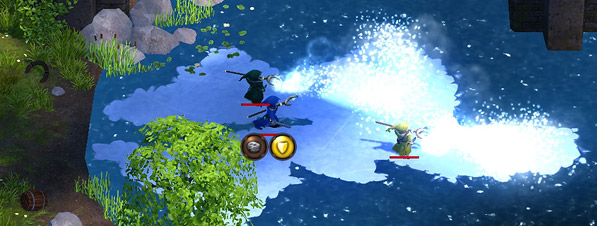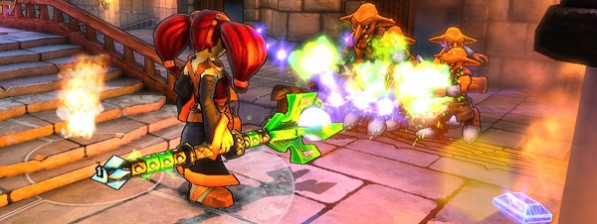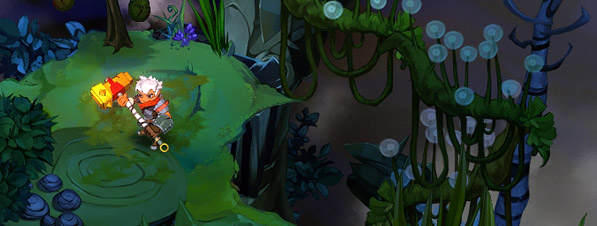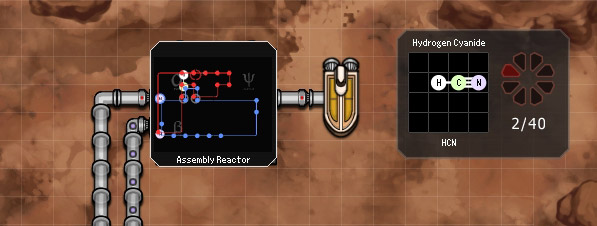Usually I wouldn’t even consider writing one of these lists because my playing throughput is so spectacularly bad that I’m always — and by some margin — behind the curve with releases. The 2011 wave has been a particularly overwhelming one for me with game after game crashing in and yet, somehow, I’ve managed to stay afloat and play enough — merely enough — of them to warrant chiming in.
Just to be clear, I have not played Skyrim, Human Revolution, Arkham City, Battlefield 3, Dark Souls, Dead Island, Uncharted 3 (though this is next), Bulletstorm, Shogu— oh sod it, if it’s not here then it’s likely I haven’t played it yet. Or played it enough. I’ve only just started Saints Row: The Third and while I’m having an absolute riot with it, I feel it’s a little too early to be including here. Watch this space.
2011 has been a year of many things for me. It’s been yet another year where the indies have shown the AAA developers how to do soundtracks properly without defaulting to forgettable orchestral scores. It’s also been a year of rampant multiplaying with most of this list being made up of games which I played primarily with others. But perhaps more than anything else, 2011 has officially been the year of the giddy ‘squeee!’ because I don’t think I’ve been tickled silly by so many different games in a long time. My poor girlfriend has had to put up with me waxing lyrical about countless moments from some of the games below (much to her befuddlement) and thanks to a certain Joel Goodwin some of my 2011 giddiness has been immortalised in video format forever. Well, at least until the sheer weight of inane comments causes YouTube to buckle and implode on itself. But more on that video later.
This list has been a good reason for me to write about some of the memorable games I’ve played and neglected to mention over the last twelve months. I’ve restricted my list to this year’s releases just to keep a cap on the entries, it could have got a little out of hand otherwise. In no particular order, here are my Games of 2011:
Magicka
 Did you know, it’s an unwritten law that all games involving swords should allow you to fire rows of volcanoes from them? Unfortunately however, it seems that only Magicka does. For that alone, it makes the cut for this list. It also happens to have what I consider the best magic system to ever grace a game. Which is only fitting given the game’s title. Quite frankly, it’s incredible. There’s no worrying about all that mana and cooling down nonsense, there’s just eight elements (arcane, life, shield, cold, lightning, earth, fire, wind and water), hundreds of combinations, and four ways of casting your concoctions (self, local area of effect, projectile and weapon enchant). If you combine water with fire or cold you get two more elements as well (steam and ice, respectively) to add to the mix. Casting a specific spell is simply a matter of remembering the combo and having the reflexes and finger dexterity to pull it off.
Did you know, it’s an unwritten law that all games involving swords should allow you to fire rows of volcanoes from them? Unfortunately however, it seems that only Magicka does. For that alone, it makes the cut for this list. It also happens to have what I consider the best magic system to ever grace a game. Which is only fitting given the game’s title. Quite frankly, it’s incredible. There’s no worrying about all that mana and cooling down nonsense, there’s just eight elements (arcane, life, shield, cold, lightning, earth, fire, wind and water), hundreds of combinations, and four ways of casting your concoctions (self, local area of effect, projectile and weapon enchant). If you combine water with fire or cold you get two more elements as well (steam and ice, respectively) to add to the mix. Casting a specific spell is simply a matter of remembering the combo and having the reflexes and finger dexterity to pull it off.
Flaming boulders, ice shards, electrical beams, walls of earth, chain lightning, fiery earthquakes, you name it, Magicka’s got it. In the midst of battle it can get pretty crazy wielding all these elements and combinations and different ways of casting them, but because Magicka never takes itself seriously all the spell miscasting, friendly fire and self-destruction becomes a vital part of the game’s humour. It’s pure slapstick and never ceases to be entertaining. I remember one very early moment where me and three friends were trying to cross the wide river shown above by freezing its surface. We’d not mastered the different ways of casting by that point and our icy walkways were narrow and/or horribly misshapen so there was an awful lot of slipping around on the ice, slipping off of the ice and slipping through the ice as it melted. Needless to say we were laughing a lot while we were drowning.
The lengthy 13 level campaign (which can be played with up to three others) features countless references to popular culture and coupled with the constant discovery of new spell combinations as well as the goofy satirical sense of humour and pseudo-Swenglish throughout, the experience keeps bubbling over very nicely indeed. Since its release Magicka has been expanded upon considerably by adding a new player versus player mode, more survival and PvP maps, extra campaigns, weapons and costumes. It’s a tremendous little package for anyone hankering for some funny solo, co-operative or competitive chaos and even more so with willing friends.
Brink
 Yes yes, this is one of my games of the year. Brink suffered from a catastrophic launch that irretrievably pushed many potential players away, and its awkward, but for me, refreshingly unique position somewhere between Call of Duty and Enemy Territory, lost fans of either franchise further damaging its reputation and, by extension, its community.
Yes yes, this is one of my games of the year. Brink suffered from a catastrophic launch that irretrievably pushed many potential players away, and its awkward, but for me, refreshingly unique position somewhere between Call of Duty and Enemy Territory, lost fans of either franchise further damaging its reputation and, by extension, its community.
For a couple of months or so after my revisited review of Brink I was still doubting the high score I’d given it and truth be told, I probably always will be, mainly because of the many persistent dissenting views out there, but only recently I fired it up for the first time in a couple of months and now I’m hooked again.
It’s the weapons and their irresistible customisations, the different body types and classes that dramatically alter the experience from level to level. It’s the chokepoints, the myriad ways of dealing with them and the thrill of your team’s efforts coming together to push through the enemy. It’s the slick parkour, the incredible art direction, the labyrinthine and beautiful environments that I’m still finding new routes through, it’s the lovely musical flourishes, the moral ambiguity of the two opposing forces and that satisfying objective-driven gameplay that kept Quake Wars interesting for so long. It’s not without its flaws. The interface and certain interactions can feel a bit clunky and unresponsive at times and I’m yet to hear another player’s voice (which really gets my back up for a multiplayer game as team oriented as this), but even after 65 hours I’m still being drawn in by it, which, given my usual play threshold, is an impressive feat indeed. In fact, it’s the most played game in my Steam collection. Make of that what you will.
Frozen Synapse
 Hot on the heels of Brink’s total play time comes Frozen Synapse which I’ve apparently sunk 52 hours into, and that’s not factoring in the time I spent with the beta in 2010. And that’s also without playing anything but multiplayer, and largely on one particular game mode. I dabbled with some of the others — Disputed, Secure, Hostage and Charge — but none so much as the traditional deathmatch mode Extermination, which, if it wasn’t for the game’s tight mechanics and tactical bent wouldn’t be nearly as entertaining as it has any right to be.
Hot on the heels of Brink’s total play time comes Frozen Synapse which I’ve apparently sunk 52 hours into, and that’s not factoring in the time I spent with the beta in 2010. And that’s also without playing anything but multiplayer, and largely on one particular game mode. I dabbled with some of the others — Disputed, Secure, Hostage and Charge — but none so much as the traditional deathmatch mode Extermination, which, if it wasn’t for the game’s tight mechanics and tactical bent wouldn’t be nearly as entertaining as it has any right to be.
Frozen Synapse is a thinker’s game. It made me pull a lot of faces like this throughout my time with it:
It’s a game that makes micromanagement an art; a form of tactical poetry. There’s nothing quite like spending anything up to an hour choreographing a series of complex maneuvers and, once committing them, seeing the fruits of your labour as your squad of ‘vatforms’ elegantly dispatch the enemy with cold surgical precision. Those moments were audibly gleeful (or should that be squeeful?) and had me grinning from ear to ear. Alternatively however, there was nothing quite like seeing the heartache of a horrible, horrible oversight or miscalculation as your vatforms got blotted out in the space of five seconds. Your plan revolved around that one guy killing that guy and he died and now they’re all dead. Those moments were… well, they were just shit.
You see, there’s a whole cruel meta-game to Frozen Synapse that’s not unlike poker; it’s as much about projecting intentions (false or otherwise) as it is about reading your opponent’s. Are they going to do this? Or are they going to do that? Which do I plan for? ‘Follow your instinct’ never sounded so ridiculous to me. Countless times I overthought a move thinking that my opponent had a much greater scheme in mind, when, all the while, they hadn’t. Other times the opposite would happen, I’d play it simple, dismissing certain outside possibilities, and consequently succumb to a swift, agonisingly simple defeat. In the end, that’s why I stopped playing because I was becoming my own worst enemy, constantly questioning my own reasoning. Down that road lied madness.
I can’t comment on the single player story mode, but as a multiplayer competitive game Frozen Synapse is an exhilarating, intense, tightly designed and deceptively deep experience that deserves the attention of anyone partial to some genuinely thoughtful turn-based strategy. It’s also worth mentioning that the excellent techno ambient soundtrack by nervous_testpilot (co-owner of Mode 7 Games) suits the sharp, neon blues of the game perfectly. Hear for yourself.
SpaceChem
SpaceChem. SpaceChem. SpaceChem.
I really didn’t see this one coming. Well, there was Helmut’s first impressions way back in July but the last thing I was expecting was a puzzle game so… well, so damn perfect. SpaceChem is a real puzzle game. It’s not one that relies on twitch reflexes and quick thinking, it requires thought and foresight and resourcefulness above anything else. It’s a fiendish puzzler that creeps into your conscience in the dying moments of the day before you fall asleep, or over breakfast, or while you drive to work or cook dinner.
SpaceChem is a hard sell because it’s ultimately a logic game frolicking with chemistry. You’re a scientist and on each level you have to manufacture a number of specific molecules. Sometimes you’re given molecules that you have to break down and reassemble, sometimes you’re given raw elements and it’s simply a matter of bonding them together. What makes SpaceChem so magical is that there are countless ways to complete each level — there are no predetermined solutions. The sense of ownership and pride you have over your latest and greatest creation is palpable. It wasn’t unusual for me to giddily laugh out loud and shout ‘YES!’ from upstairs after finally cracking a level, watching my solution hypnotically whizz particles around a reactor. And ‘hypnotic’ is exactly the right word to use. I mean, just look at Helmut’s creation of Polyethylene, it’s a little wonder:
See? No? Okay.
SpaceChem is confusing at first but thankfully it gently introduces you to the very mechanics that it will later torment you with. I’ve been playing the game for around 10 hours now and the sheer volume of things to factor in is making me pull even more of the faces shown above. It’s hard work.
And some will see SpaceChem as work — as SpaceChore — just like my girlfriend did, but others like myself will get a genuine kick out of cracking the wide-open puzzles. The graphics are clean and crisp, the music by Evan LE NY is melodic and often quite beautiful (here’s my favourite track) and the surprise story is well written — and so far compelling. It’s the best puzzle game I’ve ever played. There, I said it.
The Dream Machine
 Given my adverse reaction to LucasArt’s seminal Grim Fandango earlier on in the year, I thought I’d reached the end of my adventure gaming days. If Grim — supposedly one of the best adventure games ever made — couldn’t entertain me, then what could?
Given my adverse reaction to LucasArt’s seminal Grim Fandango earlier on in the year, I thought I’d reached the end of my adventure gaming days. If Grim — supposedly one of the best adventure games ever made — couldn’t entertain me, then what could?
The Dream Machine, that’s what.
Between its beautiful presentation (visually as well as aurally), its effortlessly natural writing, its refreshingly logical puzzles and its compelling central conceit, The Dream Machine single-handedly restored my faith in a genre I thought I’d all but done with. Even my girlfriend enjoyed it and she hasn’t been so easily to please on the adventure game front. The third chapter was released a couple of months ago which we both intend to play as soon as possible, in the meantime however, for more of my thoughts on the first two chapters see my first impressions here. To play the first chapter free of charge then visit The Dream Machine’s main site here. You’ll not be sorry.
Dungeon Defenders
 Dungeon Defenders is a very recent entry to this list and has, for the last few weeks since arriving back from Australia, dominated my multiplayer co-op time. It has, what I’m going to call, a ‘Bermuda Triangle of addiction’ which you can very easily get lost in. The three cornerstones of this triangle are loot, loot, and the promise of more loot. Okay, perhaps it’s not — it may as well be — but for me it’s the ever-compelling strategy of tower defence, the weirdly alluring and steady grind to becoming an all-conquering demi-god, and the higher difficulty levels begging to be bettered that are all too quick to knock you back down again.
Dungeon Defenders is a very recent entry to this list and has, for the last few weeks since arriving back from Australia, dominated my multiplayer co-op time. It has, what I’m going to call, a ‘Bermuda Triangle of addiction’ which you can very easily get lost in. The three cornerstones of this triangle are loot, loot, and the promise of more loot. Okay, perhaps it’s not — it may as well be — but for me it’s the ever-compelling strategy of tower defence, the weirdly alluring and steady grind to becoming an all-conquering demi-god, and the higher difficulty levels begging to be bettered that are all too quick to knock you back down again.
It all starts pathetically enough; you choose one of the four characters available (Apprentice, Squire, Huntress or Monk), you have a single tower or trap to deploy, a shitty weapon and a number of waves to vanquish between build phases. Then you level up and assign a few skill points. What’s that? A new tower for me? Nice. Then you collect some loot which makes your character a bit more potent in combat. What’s this? I can level up my weapons and armour and choose what parts of them to upgrade? Sweeet. But I haven’t got enough mana to spend on upgrades so I’d better sell some of this junk. Woo! I’m rich!! I’ll upgrade my weapon straight away! Aaand now I’m skint. I’d better amass more mana. Oh look here, the shopkeeper at the tavern sells pets b-b-but Holy Mother of Fuck they’re expensive! And look at this ‘dope-ass’ (Armand’s phrase, not mine) weapon I picked up… I can’t use it till I’m level 14 and I’m only level 7 and and and …oh crumbs.
Then it’s all down hill from there. Before you know it you’ve got hundreds of items to wade through to store or sell to the shopkeeper and you’re still wanting more: more loot, more mana, more xp, more challenges, and yet, all the while, Dungeon Defenders gleams. The graphics are bright and chunky (though rest assured, the colour saturation can be altered); the tower defence is solid; the combat, whether you choose to play top-down, in third-person or first-person is satisfying and punchy; there’s an impressive and varied list of levels and challenges; there’s detailed and robust stat-tracking, the results of which can be viewed after each level; there are countless ways to customise your character’s stats and equipment; a difficulty scale which is guaranteed to keep you on your toes (easy, medium, hard, insane, nightmare and now, hardcore nightmare — gulp); a shopkeeper who seldom mutters funny quips (‘Brown, is realistic’); but most importantly however, Dungeon Defender’s allows for (and encourages) up to four player co-op, and obviously, all this polished goodness shines even more with a few friends. So far it’s been a blast.
Bastion
 There are two things that make Bastion such a joy to play, the game’s presentation and its responsiveness to the player.
There are two things that make Bastion such a joy to play, the game’s presentation and its responsiveness to the player.
The former is as clear as day; the graphics are detailed and lush, bursting with life and colour; the menus are simple and intuitive and the music is… well, the music is head and shoulders above anything else I’ve heard in a long time. It’s a stunning effort by composer and multi-instrumentalist Darren Korb and worthy of all the praise it gets. Be sure to pick it up with the game if you get a chance. I mean, just listen to this. Or this, or this, or even this.
The latter, the game’s responsiveness to the player, is perhaps Bastion’s calling card next to its soundtrack: the narration — or perhaps more specifically — the narrator. If you’re unfamiliar with Bastion then I really don’t want to spoil it for you because there’s real magic in witnessing it at first hand, suffice to say, it’s unique and, as far as I’m concerned, an innovation that could (and should) inform future games.
Although I’ve not fully completed Bastion (I’m on my second requisite playthrough), the story is enthralling and the hacking, shooting and slashing, while not especially interesting in itself, is solid and superbly balanced with all the weapons and their upgrades feeling every bit as useful as each other. An innovation which seems to have been overlooked by many is Bastion’s handling of difficulty. There are no difficulty levels in Bastion, just a ‘shrine’ which allows you to invoke multiple deities. Each deity adds certain buffs to enemies making them significantly more difficult to deal with but they also yield higher rewards ie. more experience and more shards (the game’s currency). It’s a very simple and elegant way of carefully controlling and ramping up the difficulty if you’re finding the game a little too easy. Anyway, Bastion is brilliant, go and play it.
Portal 2
There are two overarching things I remember about Portal 2: the triumphant comedy of the single player and the revelatory co-operative mode. I say revelatory because while the single player did very little wrong (it felt to me a little stretched out and baggy in places) it never quite evoked that same sense of awe that the first game did (and neither did I expect it to, Portal was fresher than a crisp British winter). No, the unlikely co-operative mode was revelatory because it went on to do exactly what the first game did: evoke awe, albeit of a different sort.
Portal 2’s co-operative mode took all the mechanics present in the excellent single player game — the light bridges, the buttons, the goos, the grav shafts, the light cubes — dispensed with the story elements and action set-pieces, reinstated GLaDOS’s frictional meta-game commentary, reined in the cavernous test chambers and filled them to the brim with deliciously devious puzzles. It was basically Portal all over again with the puzzling back at the forefront of the experience, only this time, you had a partner to share that experience with. My co-operative partner was Joel ‘Harbour Master’ Goodwin of Electron Dance and between the two of us we shared what I consider one of the best co-operative experiences I’ve ever had (sorry Luke, Armand and Mike!).
Joel and I were two individuals exploring each test chamber together; a disparate unit feeling around these initially baffling spaces for tendrils of a (made up word alert!) tandemic solution, sharing whatever (melo)drama arose along the way. And indeed, plenty did. Whether it was the initial apprehension of entering a deadly looking test chamber or the giddy, nervous tension of synchronising different parts of an ingenious solution, Portal 2 provided a sort of stage to act up and perform on, or as Joel put it: ‘The game is the circus tent; we get to be the clowns’. And he’s right; we were naturally playing every moment up; riffing on our own reactions for our own personal amusement. This quality couldn’t be better evidenced than in Men of Science, a candid video montage of the two of us playing co-operatively, recorded and edited by Joel as part of a Portal 2 chat we had earlier on in the year. At the time I was totally unaware I was being recorded so the Gregg you hear there giggling is the real deal and, incidentally, one having A Lot of Fun.
For me, Portal 2’s co-operative mode was an exhilarating high-wire act quite unlike anything else. It’s what I remember most fondly about the game and what ultimately secured its spot on this list. Thanks to Joel, I don’t have to worry about that memory fading either; here’s Men of Science, my favourite video of the year (not that I’m biased or anything):
![]()
![]()





So many of these games are ones that I’ve been meaning to play for ages. Where you’ve been playing the indies, I’ve been playing the AAAs, I guess. Together we’ve got one complete gamer!
I have some vicarious experience with Magicka, though: when it first came out I walked into a friend’s project room and saw him and three of his teammates playing, so everyone was in the same room. They were still trying to work out the dynamics and everything and I got to gleefully watch as they accidentally, and then intentionally, dropped rocks on each other’s heads. Hilarity ensued.
Like Dix, a huge handful of these games are ones I’ve been meaning to play, or wanted to play, or even bought with the best intentions of playing! Now I have no excuse.
Fabulous write-up, Gregg, and good on you for inventing a word (“Tandemic!”). It’s great to see the love for these smaller, cleverly-made indie games. Hats off to the developers and to your multiplay crew for having such fun with most of them.
I’m liking the game choices.
For me this year has been the year of coop.
Magica was great fun laying through and there was many moments i was crying and shouting out loud. All of which lead to me getting shouted at by the other half to shut up.
Dungeon defenders is not just my game of the year but very possible my best game ever. Everything about the games just makes you want to come back for more.
Its also good to see you really enjoyed Bastion. I have not played it yet but Armand pushed me in its direction when it was on offer and I was unable to say no.
Wow, lots of cool indie stuff I haven’t played… but I did pick up Bastion recently! The buzz has been really good on it, so glad to see another endorsement.
In another reality Fotonica, Sanctum and Dungeons of Dredmor might have made this list but unfortunately I got distracted from them by various other games at some point.
@Dix: Magicka’s humour stems directly from the gameplay and I think that’s what makes it so special as a comedy game. It’s not funny because the laughs are scripted (though there are plenty that are), its funny because the idea and the mechanics of the game allow for it.
It’s like those moments in a film when an apprentice is pissing about with a spell and misfires it or does something totally unexpected, you get that all the time in Magicka and when there’s four of you doing it with spells that are deadly it’s just hilarious.
@Steerpike: That’s a fair point! Big up to all my co-op homies! Hmm, ‘homies’. I blame Saints Row and Armand. If in doubt, blame Armand.
@Luke: I was in two minds whether to include DD because I can’t escape the feeling that I’m going to burn out on it or its going to run out of tricks. My time — our time — with it so far has been excellent, I just hope it can keep it up!
@AJ: It’s easily endorsed! 😉
This is a nice list and not just because I’m mentioned in it. Of course, I haven’t played any of this stuff except for Portal 2. I even bought SpaceChem on fucking release day but am the last person to play it!
Man, I’ve still got games from 2007 I haven’t played. But I think 2011 was definitely a great year for vidya games.
Please let me announce “a form of tactical poetry” is my favourite line.
I forgot to mention At A Distance by Terry Cavanagh as well! Too many games indeed.